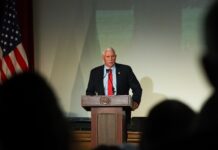PASSHE chancellor Dr. John C. Cavanaugh visited SRU last Thursday as ASPCUF prepared to vote for strike authorization.
The Association of Pennsylvania State College and University Faculties (APSCUF) has been bargaining with the Pennsylvania State System of Higher Education (PASSHE) for almost two years in order to agree on a new contract for the union. Until a new contract is agreed upon, the previous one remains in effect.
In October, APSCUF requested the contract to be settled through the means of binding arbitration. This means that both APSCUF and PASSHE would have to give all of their documentation to a third party who would create a contract that both parties would be required to follow. PASSHE denied the request.
“We believe it would be improper to delegate those responsibilities to a third party arbitrator who does not have the responsibility or duty to consider the financial implications of their decisions and who is not obligated to take into account the interests of Pennsylvania taxpayers or the long-term effects of those decisions on the Commonwealth or PASSHE,” Cavanaugh stated in a press release.
In response to this, ASPCUF decided to take the next step in negotiations and call for a strike authorization vote. A strike authorization does not necessarily mean that the faculty will go on strike, but instead it signifies that APSCUF can vote to strike if deemed necessary.
President of the SRU chapter of APSCUF Dr. Patrick Burkhart explained that a strike authorization demonstrates that the union is serious about reaching a settlement, and by passing a strike authorization PASSHE should have more leverage at the bargaining table.
Voting for the strike authorization took place Monday through Wednesday at all 14 universities that belong to APSCUF.
Members of the union were able to vote for or against passing the strike authorization. If a majority of the faculty votes for the strike authorization, than the strike authorization will be passed. The results of the vote are expected to be released on Friday.
On November 8, PASSHE Chancellor Dr. John C. Cavanaugh visited the SRU campus in order to hold a question and answer session about the negotiations. Cavanaugh stated that he would not be able to answer any specific questions about the status of the negotiations.
“How is [PASSHE] planning on changing itself in a commensurate way to what it is that they’re demanding of the faculty?” another professor asked.
“Let’s talk about the cost side,” Cavanaugh responded. “As a system we’ve taken over $20 million out of the cost, primarily on areas of efficiency, energy conservation, and, frankly, the elimination of positions over the last decade. There are also certain external realities that we don’t have to like them, but they’re there. There’s an economy around us, and there are new things emerging in higher education.”
Cavanaugh also explained that the public has been less supportive of public universities in recent years. He believes that one of the essential tasks of both PASSHE and APSCUF is to prove that public higher education is a high quality investment.
He stated that hiring high quality professors and by creating academic programs that demonstrate that students are gaining the knowledge and skillset that they need for the real world.
“I think that that part of the problem is that by offering lower salaries and by saying online education is exactly equivalent, by saying ‘we want more temporary faculty’, and ‘we’d like to cut the temporary faculty to the point that they’re making less than many of the graduates that are coming out of the PASSHE system,’ you’re actually reinforcing the message that college faculty are overpaid, the value of higher education is not there, and what you’re getting out of the university is something that can be cut rate,” assistant professor of history Dr. Aaron Cowan said. “It seems as if the message is that faculty aren’t as valuable.”
“I understand how you draw that conclusion,” Cavanaugh responded.
Assistant professor of philosophy Dr. Andrew Colvin thought that it was important for Cavanaugh to visit campus right before the strike authorization vote because it allowed the head of PASSHE to directly listen to and address the faculty’s concerns.
Colvin understood that Cavanaugh was unable answer certain questions because of the negotiations, but with that being said he was disappointed about some of the chancellor’s answers.
“On the one hand he said that there are three elements [to quality education],” Colvin explained. “You have good faculty, good learning experience, and you have good students. Yet the proposals being put forward by the state are going to make it very hard to retain and attract good faculty. The three work together. He seems to suppose that you can have good education experience and good students without good faculty. You can’t.”
“Another thing that I was disappointed about was that he made several remarks about the negative public perception of public education, and I wonder how he’s gauging that,” Colvin said. “And secondly, he didn’t say what he’s doing about it.”
Immediate past president of the SRU chapter of APSCUF, Dr. Jace Condravy, was disappointed with Cavanaugh’s presentation.
“He simply wouldn’t address the faculty’s concerns,” Condravy explained. “He knows damn well that there are concessionary proposals on the table. I understand that he can’t negotiate those particular items but he knows why we do not have a contract yet, and he actually tried to inject optimism by indicating that we were meeting again. After two years worth of meetings, I thought that was incredibly ingenuous of him. It was insulting to hear him frame negotiations like that.”
The next meetings between APSCUF and PASSHE will be held on December 11 and December 19.
Cavanaugh remains optimistic about reaching a fair agreement.
“Were not in this as enemies,” Cavanaugh said “We’re certainly not working towards opposite conclusions because if we don’t work on this together we will not be able to achieve







